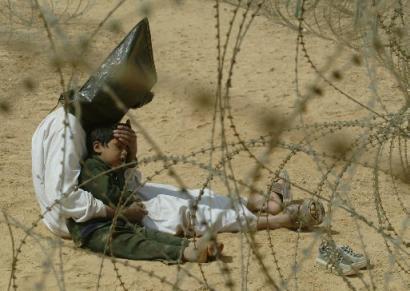...A man far from home has no neighbors. This is one of the more chilling realities of human behavior during war. For a soldier far from home, war quickly distills and separates the core ‘Self’ from the biographical self of their normal civilian identity. In Iraq, hordes of young troops unmoored from their normal worlds, well armed, and in a position of awesome power, perhaps more power over human life than they could ever have previously imagined, are thrust into a land of chaos and confusion. Normal life, the adornments and habits of everyday life that define one’s civilian identity, are packed away along with civilian clothes. When you strip away the layers of this everyday-life ‘self’, the core had better be sound. Training the core of a person is what we might call instilling a sense of ethics, morals or values. We are all ethically fuzzy and the core shows its face on war’s vast moral playing field.
The military trains soldiers and not philosophers. War is far from the secure walls of the academy. Among other things, war is exhausting, filthy, terrifying, and stressful. After you have gone through the experience, you tend to look askance at anyone who utters such things as, “Man, I really worked my ass off today”; or, “My life is so stressful,” particularly when the speaker is an academic or someone in the professional class. It is no disparagement of or diminishment of anyone’s legitimate daily struggles, but a reminder of the peace and safety we generally take for granted in the universe of our ‘normal lives.’
[...]
Thucydides wrote in his History of the Peloponnesian War that the reality of power between states is, “the strong do what they have the power to do and the weak accept what they have to accept.” Armies operate as an extension of state power, but in a free society where our soldiers are volunteers and not conscripts, they meet their situations as individuals with values and a moral core absorbed through a variety of sources. Their behavior affects the hopes for fellowship across cultures, languages, and religions. From the security of our normal lives, we can bemoan and criticize the invasion of Iraq. But we must never forget that everyday, essentially decent young men and women face the most challenging situations and dilemmas they will ever encounter. They are far from their homes and neighbors. What will guide them?
I challenge philosophers and humanists to develop a work that targets this audience. The soldiers need your help if they cannot get it from their leadership. As humanists and free thinkers we need to get our message into the hearts and minds of those young soldiers who are becoming the diplomats of the free world, for better or for worse.
link

If you're not outraged, YOU ARE NOT PAYING ATTENTION.
No comments:
Post a Comment